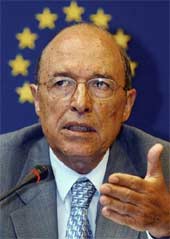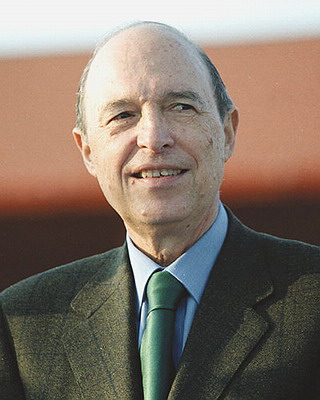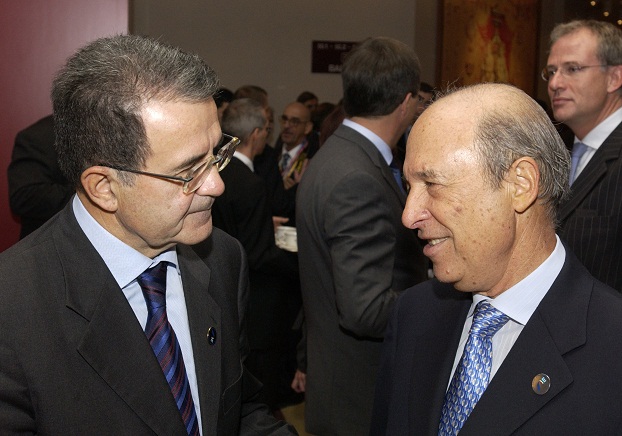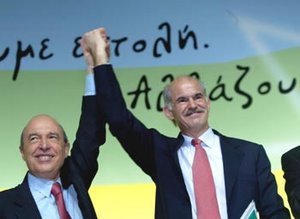<Back to Index>
- Mathematician André Tacquet, 1612
- Composer Carl Heinrich Carsten Reinecke, 1824
- Prime Minister of Greece Costas Simitis, 1936
PAGE SPONSOR



Constantinos Simitis (Greek: Κωνσταντίνος Σημίτης) (born 23 June 1936), usually referred to as Costas Simitis or Kostas Simitis, was Prime Minister of Greece and leader of the Panhellenic Socialist Movement (PASOK) from 1996 to 2004.
Costas Simitis was born in Piraeus to Georgios Simitis, a Professor at the School of Economic and Commercial Sciences, and to his wife Fani (née Christopoulou). He studied Law at the University of Marburg in Germany and economics at the London School of Economics. He is married to Daphne Arkadiou and has two daughters, Fiona and Marilena. His brother Spiros Simitis is a prominent jurist specializing on data privacy in Germany. He currently resides in the Kolonaki district of Athens.
In 1965 he returned to Greece and was one of the founders of the "Alexandros Papanastasiou" political research group. In 1967, after the military coup of 21 April, this group was transformed into Democratic Defense, an organization opposed to the military regime. Simitis escaped abroad after planting bombs in the streets of Athens (in later years he acknowledged his activities on Greek MEGA TV channel) in order to avoid being jailed and became a member of the Panhellenic Liberation Movement (PAK), led by Andreas Papandreou. He also took up a position as university lecturer in Germany. He returned to Athens in 1974 and was one of the co-founders of PAK's successor, the PASOK. In 1977 he took up a lecturer's post at the Panteion University.
Simitis was not a candidate for the Greek Parliament in the 1981 elections, but he was appointed Minister of Agriculture in the first PASOK government of that year. Following the 1985 elections and his election as a deputy to the Parliament, he became Minister of National Economy; he undertook an unpopular stabilization program, trying to curb inflation and reduce deficits, but resigned his post in 1987 because he felt that his policies were being undermined. In 1993 he took over the Ministry of Commerce and Industry, but in 1995 he again resigned from the ministry and the party's Executive Bureau following a public rebuke he received by Prime Minister Papandreou.
On 16 January 1996 Papandreou resigned as Prime Minister due to ill health. In a special election held by the party's parliamentary group on 18 January, Simitis was elected in his place, over the candidacies of Akis Tsochatzopoulos, Gerasimos Arsenis and Ioannis Charalampopoulos. Papandreou, however, remained Chairman of the party for the next months until his death on 23 June, just before a party conference would select the party's vice-president; after Papandreou's death, the conference would elect the new Party President. Simitis was elected in PASOK's Fourth Congress on 30 June, defeating Akis Tsochatzopoulos on a platform of support for the European Union.
Simitis then led the party in the national elections of 22 September 1996, gaining a mandate in his own right. He also narrowly won the national election of 2000. Although he is widely respected throughout Europe, in Greece Simitis was regarded by some Greeks as a rather dull technocrat, lacking the charisma of Papandreou.
On
7 January 2004, with PASOK's popularity collapsing, Simitis announced
that he would resign as party president and would not stand for
re-election as Prime Minister in the forthcoming legislative elections.
At the time he was accused of bowing out to avoid humiliation at the
polls. However, by the end of his tenure on March 10, he would be in
office for over 8 consecutive years, the longest continuous term in
modern Greek history. In a past interview Simitis had already stated
that he would remain prime minister for only two legislative periods,
since "he wanted to do other things in his life as well". On 8 January
he called elections for the position of party president to be held on 8
February. Simitis was succeeded as PASOK leader by then Minister of
Foreign Affairs George Papandreou, the only candidate in these elections. Despite Papandreou's personal popularity, PASOK lost the March 7 elections to the conservative New Democracy party, whose leader Kostas Karamanlis succeeded Simitis in the office of Prime Minister. Simitis is largely known in Greece for his political philosophy which is known as Eksynchronismos ("modernization") which focuses on extensive public investment and infrastructure works
as well as economic and labor reforms. Simitis is credited by his
supporters with overcoming chronic problems of the Greek economy and
thus achieving the admittance of Greece into the Eurozone.
(One sees, in retrospect, that these problems were never really
overcome, but rather hidden by Greece's partners through expert
economic manipulation. And once the governments lacking the concealing
finess came to power, these pre-existing problems resurfaced. The
situtation became even worse due to common European monetary policies
that the Greek economy was too weak and problematic to be able to abide
by unscathed.) During the period of his governance, official data
presented inflation
as having decreased from 15% to 3%, public deficits diminished from 14%
to 3%, GDP increasing
at an annual average of 4% and factual labor incomes having increased
at a rate of 3% per year. However, the macroeconomic data presented by
Simitis' government were called into question by an audit performed by
the successor government of New Democracy in 2004. Eurostat concluded
in 2006 that the public deficit of the Greek economy amounted to 6,1%
in 2003, more than double the percentage presented by Simitis'
government. The
results of the audit concluded that the PASOK administration used
different accounting methods, especially for calculating the military
expenses during its term. The government of New Democracy used the
revised data as a means to criticize the previous government for
incompetent economic policy and a falsification of an economic
indicator, namely the public deficit, which among other criteria was
used as a basis on which Greece was accepted into the Eurozone. PASOK
contested the accusations and claimed that 2006 Eurostat changes to the
system of defense expenditure calculation legitimized
the practices of the Simitis government. New Democracy responded that
the defense expenditures covered by those changes constituted only a
small part of much more substantial expenditures that were fraudulently
concealed by the PASOK government. Whether Simitis' government
conducted any unconventional handling of Greek fiscal data continues to
be a hotly contested issue between the two political parties. (It is
true, however, that despite the New Democracy's accusations and the
mishandlings of the Simitis' government, the subsequent New Democracy
government under the incompetent Prime Minister Karamanlis and the,
perhaps even more incompetent, Economy Minister George Alogoskoufis,
fared even worse. The new Prime Minister George Papandreou had to
assume the responsibility of the serious clean-up of his predecessors'
mess, with, fortunately, generous backing and support from Greece's
European and world partners.) A
major issue during Simitis' tenure concerned corruption, which has
become endemic in Greek public life. Simitis rejected New Democracy's
bills for accountability and transparency with regards to governmental
expenditure and decisions, and New Democracy leader Kostas Karamanlis accused Simitis during a parliamentary plenum of being an "archpriest of cronyism", referencing the index of the NGO Transparency International. However, Greece's position has fallen by 5 places in
the same index during the New Democracy government. Four years later
Karamanlis himself admitted that he exagarated and that he never
doubted Simitis' honesty. Many
large-scale infrastructure projects were carried out or begun during
the so-called 'era of Eksychronismos', such as the new "Eleftherios Venizelos" Athens International Airport, the Rio - Antirio bridge, the Athens Metro, or the Egnatia Odos.
In 1996, the appointment of the PASOK leaning "To Vima" newspaper editor, Stavros Psycharis, as political administrator of Mount Athos was
particularly criticised by the opposition. In 2000, Simitis was
embroiled in a dispute with the Archbishop of the influential Greek
Orthodox Church, Christodoulos,
when the Greek government sought to remove the "Religion" field from
the national ID cards carried by Greek citizens on the grounds that the
Hellenic Data Protection Authority (HDPA) recommended so; its decision
also included the "Nationality" field, but was not implemented
following a subsequent EE directive to the contrary. Christodoulos
opposed the decision, claiming that the action pursued deviously the
religious de-identification of the Greek nation. Faced by the
government's robust but unpopular stance, he organised two massive
demonstrations in Athens and Thessaloniki,
alongside a majority of bishops of the Church of Greece. The attitude
of Simitis gained faint-hearted support even within his party, but
found a surprisingly militant ally in the small Left Coalition party
echoing the Eksychronismos opinion makers. The then opposition leader signed a petition, organized by the Church of Greece,
calling for a referendum on the matter and signed, too, by more than
three million citizens. However, the inclusion of religious beliefs on
ID cards, even on a voluntary basis, as the Church had asked, was
subsequently subsided, with its supporters' contribution, to appease
extra tensions in the country. While PASOK traditionalists disliked his move away from more orthodox norms of Democratic socialism, and also his relative moderation on issues such as the Cyprus dispute and the Macedonia naming dispute, his supporters saw both of these as positive elements of the eksynchronismos movement that Simitis was seen as spearheading. During January – June 2003, Simitis, as Greek Prime Minister, exercised the presidency of the European Council.









